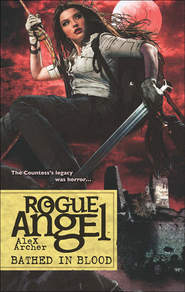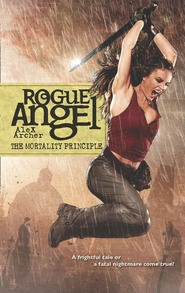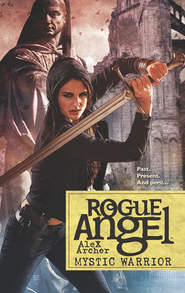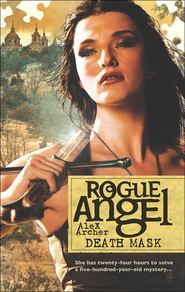По всем вопросам обращайтесь на: info@litportal.ru
(©) 2003-2025.
✖
The Lost Scrolls
Автор
Год написания книги
2019
Настройки чтения
Размер шрифта
Высота строк
Поля
She turned around quickly to see if anybody else wanted to play. She and Jadzia had the corridor to themselves. The hotel maintenance staff did not get paid to intervene heroically in these little disputes among the guests.
She turned back.
The first man she had dropped lay on the floor moaning. His face was covered with blood. He had his hand in his jacket again.
Annja did not think he was scratching an itch. Irritably she kicked him on the point of his chin. His head, which still had the fez crammed on top of it, snapped into the wall beside him. The fez fell off. He slumped.
Annja crouched quickly, reached a bit tentatively into the clamminess of the inside of his biliously colored jacket and fished out a Beretta. Straightening, she dried the grips off with two quick swipes across the rump of her jeans. Then she pulled the slide back far enough for a flash of yellow brass to confirm he had a round chambered.
“Insurance,” she said to Jadzia, whose eyes had gotten even bigger. It was true. She knew that it would be a lot easier to explain shooting an assailant to the local authorities than carving him up with a sword.
“What’s wrong with a fez?” Jadzia asked.
Annja blinked and shook her head once, violently, as if trying to shed water. “It was just way too Casablanca ,” she said. “Let’s just get out of here, okay?”
5
“I think it was the Muslim Brotherhood,” Annja said.
“Nonsense,” Jadzia replied. Beyond her, cars swished up and down the boulevard. Across the street tourists sauntered down a broad walkway that ran along the Alexandrian waterfront. “I heard one of the men shout at you in French.”
“That doesn’t mean anything,” Annja said. “Plenty of Muslims speak French.”
It was late morning. They had survived the night, at least, in a small, somewhat seedy hotel. Fortunately Annja had spent enough time knocking around the world from undergrad days onward to appreciate the fact that it was still pretty plush by Third World standards.
Jadzia had recovered from her shock—or perhaps the thrill of playing adventure spy girl—enough to gripe about the surroundings, from the mildewy smells to the stains on the bedspread.
But once she had slurped down her first mug of strong coffee well charged with sugar, and chomped her way through her first flaky pastry at the sidewalk café on the Corniche, Jadzia found something that appealed to her even more than pouting. Arguing.
Her pretty lips were twisted in a sneer as if she’d forgotten Annja had repeatedly saved her life the night before.
“They were assassins sent by the big oil companies,” Jadzia said in a tone that clearly declared Annja was a moron not to recognize the facts. “They sent them to keep the knowledge of Atlantean energy secrets covered up from the world.”
Annja didn’t react for a moment. She was struck by the fact that the lips sneering at her were covered in a carefully applied layer of lipstick. And as far as Annja knew, Jadzia had no personal effects except her wallet, some credit cards, identification and her passport.
Do I have lipstick that shade? she wondered. The truth was she seldom bothered with it, or makeup in general, except for special events. She realized belatedly she had with her a sort of premade kit—the Mr. Right Emergency Kit—provided to her by her female cronies from Chasing History’s Monsters . She had never, so far as she could recall, used it. Or so much as opened it.
I hope there weren’t condoms in it, she thought.
“Wait,” she said. Jadzia’s last statement had finally penetrated her protective shields of puzzlement. “You’re blaming the oil companies?”
Jadzia nodded.
“Isn’t that a conspiracy theory?”
“Aren’t we victims of a conspiracy?” Jadzia said in infuriatingly superior tones. “Or do you really think that those men all just independently decided to attack us last night, and wound up doing so all at the same time by coincidence? That’s just stupid.”
Annja frowned. It made the snottiness immeasurably worse, somehow, when the brat being snotty was right. At least about that angle of conspiracy. Obviously someone had conspired to hit the Polish-Egyptian dig team last night. And they’d done a hell of a job. Had it not been for the fact that she was getting used to coming under attack, they would have made a clean sweep.
Annja’s fork halted halfway to her mouth. She lowered the chunk of fluffy French pastry with frosting just melting off in the Alexandrian morning heat back to her plate. She felt her stomach do a slow roll. So many, she thought desolately.
She saw the faces of the dead. The beatnik-looking Naser, darkly pretty Maria, cheerful Szczepan Pilitowski, who had died giving Annja a chance to save Jadzia, the scrolls and herself. Ismail—Dr. Maghrabi—who had tried to shield them all with his body, and had been ruthlessly gunned down.
Is this what it means to carry the sword? a lonely child’s voice asked from the wilderness of Annja’s mind. She already knew the answer.
She could hear the gruff voice of her sometime mentor, Roux’s, trying to encompass cynicism and compassion at once, saying, “You cannot save the whole world, child.” And she knew that was true, too.
But can’t I even save those within reach of my arm?
“See?” Jadzia crowed, sipping at her coffee. “You have no answers for me.”
Anger spiked in Annja. She held her body as still as if it were encased in concrete, did not allow the anger to travel so far as her eyes. Jadzia’s malice was the petty malice of a spoiled child, she reminded herself. Innocent malice, if there was such a thing.
And surely there was. By no stretch of her vivid imagination could Annja see Jadzia setting about the callous murder of a dozen helpless, harmless men and women. Her petty rudeness belonged in a different universe from such an act.
Oddly, the very act of restraining herself from lashing back at Jadzia made Annja feel better. “I still think it was most likely Muslim fanatics,” she said in an only slightly constricted voice.
“Why would they attack our dig? Why would they care?” Jadzia asked. “We’ve never heard a peep from Islamists. No threats, not anything. And the Muslim Brotherhood has very much to do already.”
Such as waging an increasingly successful campaign to dislodge the fairly secular Egyptian government, Annja thought. She already saw the sand leaking out of her theory anyway. She had knocked around, and been knocked around of late, enough to have uncomfortably firsthand knowledge of Western special-operations gear. The attackers had worn Western-style blackout dress and night-vision goggles, and carried the generic Western counterterrorism weapon, the MP-5. Presumably the Muslim Brotherhood could buy that stuff and learn to use it. Even at Western expense, given the enormous amounts of military aid and training the U.S. gave Egypt. But for a group as determinedly old-fashioned as the Brotherhood, it seemed distinctly out of character.
Annja took a last sip of her mostly cooled coffee and stood up. “I need to move,” she said. “Getting the blood flowing will help me think.”
“THEY CONSPIRED against us,” Jadzia said again. She dangled her long legs over a parapet of rough dressed stone. Several stories below lay a little shelf of rubble at the base of the citadel wall, and then the water of the Eastern Harbor, slogging and frothing.
Annja paced the terrace behind the Polish girl. White gravel crunched beneath her soles, and she could practically feel the afternoon sun beating on the wide brim of her hat with angry fists. She tried not to think of the risks Jadzia was subjecting herself to. While signs in various languages placed at intervals warned against precisely what the girl was doing, enforcement of safety rules did not seem to constitute a priority for whatever agency had charge of the big, blocky, fifteenth-century fortress of Qait-Bey. Nobody had yelled at her to get down. As for Annja, she already understood that the only way to get Jadzia to stop doing what she was doing was to try to physically prevent her. And the last thing they needed was to draw attention to themselves by getting into a fight.
Actually, the very last thing they needed was for them both to get arrested for causing a public disturbance at a national monument. Her estimate of the Alexandrian police was such that she expected it might take them only seconds to sell the young women to whoever it was who wanted them so dead.
“Why do you blame the oil companies?” Annja asked. She hated to feed Jadzia’s probable paranoia. But she was out of other answers, and a brisk walk through winding streets and out to the tip of the peninsula through growing morning heat hadn’t done a damned thing to replenish her stock. Although Jadzia’s constant whining was at least a bit of a distraction, she had to admit.
“They have the most to lose from what we might discover,” the young Polish woman said.
Annja stopped and looked at her. “What did you find in those scrolls, anyway?”
Jadzia shrugged and kicked the heels of her tennis shoes against the yellow sandstone. They were the only part of her ensemble of the night before Annja had let her keep. “You were there for one of the most tantalizing parts.”
“That bit about the crystals? That just sounded like New Age craziness warmed over.”
Jadzia laughed. “Right. Twenty-five hundred years old is very new.”
“But, I mean, that charging-crystals stuff—”
“We found more earlier. It spoke of all those things you found so funny—flying chariots, artificial lights, lances of light. The ancient Greek who wrote those scrolls, who somewhere got a much purer version of the story than Solon passed down to Critias, he did not have the language of technology to describe an artificial power source. He probably didn’t understand it. Some kind of divine gift, like Zeus’s lightnings chained, would be the closest he could come to expressing it.”
“But using gemstones for batteries,” Annja said. “I’m no physicist, but that sounds pretty implausible.”
An Air France Airbus climbed past them from its takeoff roll, momentarily blanking out the conversation in the scream of its engines. “What?” Annja shouted.











